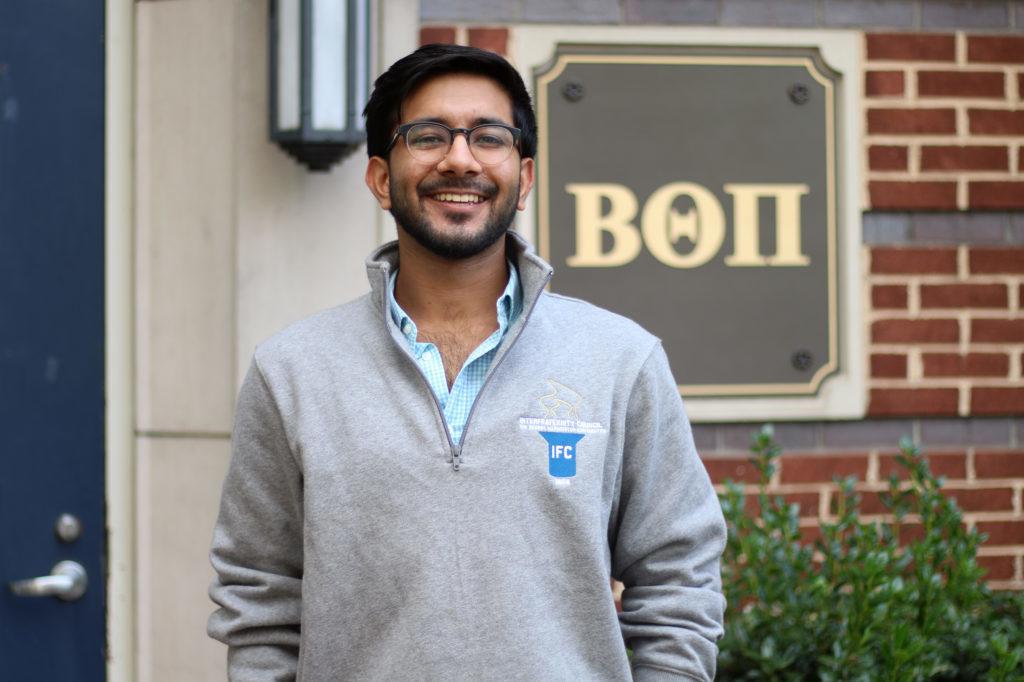The Interfraternity Council has a new president.
Senior Ali Akbar, a member of Beta Theta Pi and the former IFC vice president, took the reins as president Sept. 24 following the abrupt resignation of former IFC President Jacob Schafer. Akbar, who said Schafer resigned for “personal reasons,” said that in the three months of his tenure, he will work to bolster recruitment numbers and implement mandatory diversity and inclusion training for all members of fraternities.
Schafer did not return multiple requests for comment. Akbar declined to say specifically why Schafer resigned.
Schafer’s resignation was not announced on any of IFC’s social media pages, but Beta Theta Pi congratulated Akbar on his new position on Twitter late last month.
Akbar said he became involved in Greek life his freshman year and lived in the Beta Theta Pi house, where he served as philanthropy chairman before becoming chapter president in 2017. Akbar will serve as IFC president for three months – serving out the remainder of Schafer’s term – before the group holds a formal election for the next executive board in the spring.
“We as an IFC, collectively, can make change if we’re working together and holding each other accountable to uphold our values and what’s expected of us from our communities,” Akbar said.
Akbar said that even though he will only be president for three months, he wants to expand the number of options available to members to complete sexual assault training, which will include working with Students Against Sexual Assault to identify resources and training options.
“I want to make sure the Title IX requirements are executed better this academic year and also that we address the issues of diversity and inclusion,” he said.
IFC came under scrutiny in the spring when at least three of 14 chapters did not comply with a requirement mandating that at least 80 percent of each chapter must attend a formal sexual assault education session.
Akbar said he will also continue to work on the previous council’s sexual assault prevention task force by shifting the sessions to focus on discussion-based learning to boost attendance rates from chapters.
“I am a big fan of having student and student interactions when we talk about these trainings and these discussions because we live in the same reality, we live in the same community, and I think it’s important that we as a student body should be talking about these things,” he said.
Akbar said he aims to improve diversity and adjust recruitment strategies by expanding the role of Rho Gammas – recruitment guides for potential members – to also show the diversity of the Greek life community through training sessions this fall. He said Rho Gammas currently hold information sessions during which potential members can meet face-to-face and ask questions.
“I think freshmen have a lot of questions about Greek life, but it’s difficult for all of us to engage it when we aren’t recruiting this semester,” he said.
He added that Rho Gammas should help potential new members see fraternities “beyond the stereotypes that you think fraternities consist of.”
Akbar said he wants to require diversity and inclusion training for all fraternity members and will develop sessions with chapter presidents. He said he wants the training to prepare chapter members for “tough conversations” with students who have concerns regarding inclusion – an effort he said could help to increase diversity during the spring recruitment process.
A racist Snapchat involving three sorority members last spring put GW’s Greek community in the spotlight and left students questioning the inclusivity of fraternities and sororities on campus.
“This year is going to be the first year where we are going to be requiring fraternities to have a diversity and inclusion training,” Akbar said. “We put it in our bylaws last semester. This year we are going to be actually enforcing it.”





